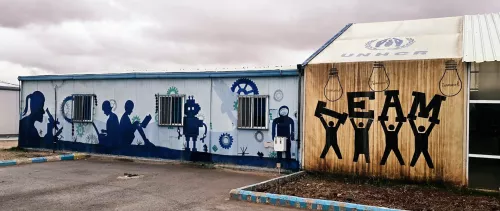
Access to digital technologies isn’t just a moral responsibility, it’s essential for global prosperity and sustainability.
Now more than ever, we need these technologies to be equitable, applicable and affordable for everyone – including the more than 1 billion people globally aged 60 years or older, as we heard at this year’s World Telecommunication and Information Society Day celebrations.
This steadily growing population group has contributed greatly to the social and economic achievements of our time. But as time passes and the world keeps changing, they face new and difficult challenges.
[embed]https://youtu.be/Vrg51jT31GA[/embed]
Digital challenges – and opportunities
I’m very pleased that members of the International Telecommunication Union (ITU) have decided to focus on older persons this year: a first in the history of this special anniversary day. Our spotlight on healthy ageing could not have come at a better time.
For more than two years now, older people – along with other vulnerable groups – have borne the brunt of the COVID-19 pandemic. For them, digital technologies have become a real lifeline.
Today, as we raise awareness about the possibilities of digital technologies to strengthen economies and societies, we can also highlight key digital challenges and opportunities for ageing populations. ITU has produced a range of reports, toolkits, training courses, and reports aimed directly at enabling digital uptake to support healthy ageing.
The UN Decade of Healthy Ageing (2021-2030) means ensuring that everyone, everywhere can make equal and equitable use of these technologies. ITU standards are part of this effort, as illustrated by a recently approved standard for accessible telehealth systems and services developed jointly by ITU with the World Health Organization (WHO).
In addition, the global multi-stakeholder platform offered by the World Summit on the Information Society (WSIS) Forum includes a special track on information and communication technologies (ICTs) and older persons, as well as the Healthy Ageing Innovation Prize and the WSIS Multi-stakeholder Alliance on ICTs and Older Persons.
I look forward to the same level of engagement in supporting digital inclusion for people of all ages at our World Telecommunication Development Conference in Kigali, Rwanda, next month, and again in September and October in Bucharest, Romania, for ITU’s forthcoming Plenipotentiary Conference.
Breaking cycles of exclusion
Since 1969, ITU has been celebrating World Telecommunication and Information Society Day without interruption. Our members and partners have marked this anniversary for 53 years, helping to promote information and communication technologies (ICTs) and services for all.
I sincerely appreciate all who contributed to the success of this day by organizing events at the national and international level.

High-level panel from left to right: Moderator Maximilian Jacobson-Gonzalez, Dr Zsuzsanna Jakab, Deputy Director-General, World Health Organization (WHO), Mr Houlin Zhao, Secretary-GeneraI, International Telecommunication Union (ITU), and Dr Jane Barratt, Secretary-General, International Federation on Ageing (IFA). Other panellists joined the event remotely, including H.E. Ms. Ursula Owusu-Ekuful, Minister, Ministry of Communication and Digitalization, Ghana; My Linh Kha, Senior Vice President and General Manager, Japan Asia-Pacific, AMGEN; and Justin Derbyshire, Chief Executive Officer, HelpAge International
Today, let us send a strong signal about the huge contribution our older persons can make in today’s digital society and economy. We can do this by investing in three key areas mentioned in our WTISD high-level panel: applicability, affordability and equitable access. Together, we can mobilize resources to help older people feel safe when they go online and increase their digital skills to use digital applications. The discussion gave us a good understanding of the opportunities ICTs can bring in benefiting older people everywhere.
The stakes are high. Worldwide, nearly 3 billion people of all ages are still unconnected. The most vulnerable populations are also the most at risk of being left offline. These include people aged 60 years and older, whose number will double by the middle of the century.
UN Secretary-General Antonio Guterres, in his message for World Telecommunication and Information Society Day 2022, has reaffirmed the urgent need to connect people of all ages by 2030. Let us heed his call and spare no effort in bringing everyone online within the next seven years. It will be difficult – but we must try our best.

Connecting the unconnected is the challenge of our time; it’s the very essence of this day and ITU’s mission.
I would also like to echo the message from the WHO Director-General, Dr. Tedros Adhanom Ghebreyesus, who highlighted the challenge of giving older persons access to transformative digital technologies.
[embed]https://youtu.be/PLd4VOSLlFs[/embed]
Together, let us reaffirm the need to break cycles of exclusion and strengthen sustainable, inclusive digital development.
Let this message be heard far and wide, to help all senior citizens enjoy happy, healthy lives, empowered by the benefits of digital technologies.
Happy World Telecommunication and Information Society Day!
View the full WTISD YouTube playlist and Flickr album.

